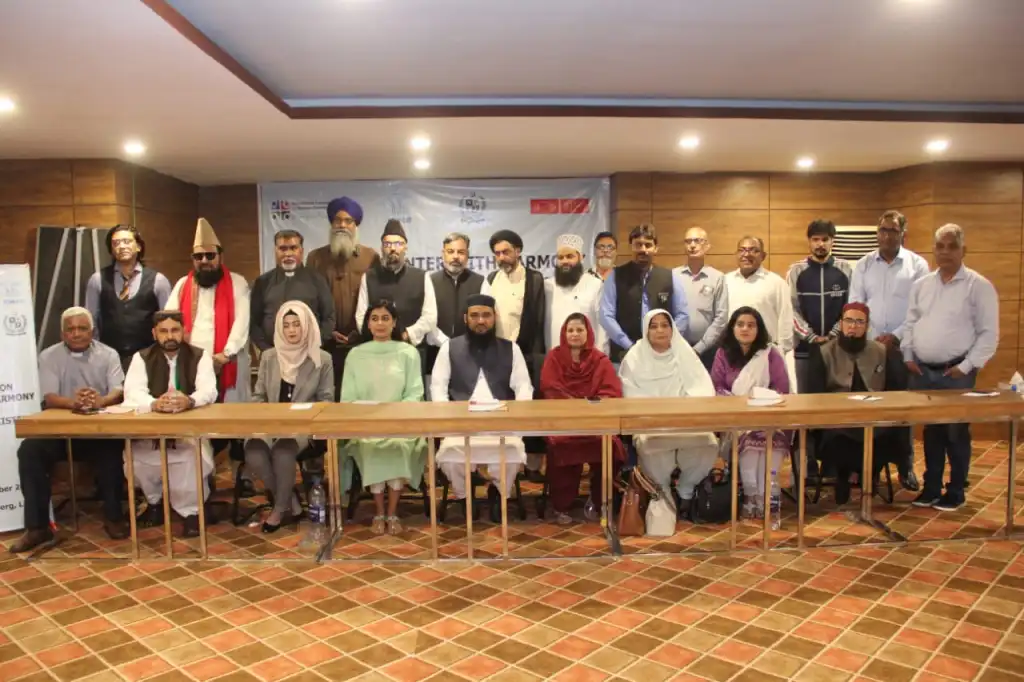Lahore: Christian Study Center, Rawalpindi (CSC), in collaboration with Ecumenical Commission of Human Development ECHD, International Peace Council Pakistan and Youth Commission for Human Rights gathered religious leaders, civil society, activists and journalists from different religions and sects to suggest practical steps to prevent and lessen tragedies similar to anti-Christian violence in Jaranwala.
The recommendation were expressed in the “Dialogue on Interfaith Harmony and Peaceful Coexistence” on Wednesday 20th September, 2023 held at Hotel One, Gulberg in Lahore.
“The recent tragedy has breached the trust and damaged the atmosphere of interfaith harmony between Christians and Muslims. Our biggest challenge is the mob mentality. This is an effort to understand our differences and take practical steps at individual and collective level for a peaceful coexistence and promote confidence building measures,” said Basir Nayyer Senior Project Officer CSC.
The 28 participants of the dialogue unanimously condemned the tragic incident of Jaranwala and expressed their concern on the growing incidents of discrimination and extremism.
“Religions was clearly misused in Jaranwala. There is a real need of policy change and act upon Seerat Un Nabi (the acts of the Prophet). God sent the Prince of Peace Prophet Isa and His last messenger Prophet Muhammad PBUH for the mission of peace. It is the responsibility of every citizen to continue it. Sadly most Muslims in our country lack knowledge of Islamic teachings,” said Shia Ulema Council Secretary Qasim Ali Qasmi.
According to Yasir Talib of the Centre for Social Justice, a leaderless mob of mostly comprising of young people, aged 16 to 25, raided Christian settlements on Aug. 16.
“Those arrested included 19 juveniles who had no idea of the terror charges and its implication and were hell bent on seeking sawab [spiritual merit]. Twisted religious teachings, increasing depression, joblessness and biased education will make it worse. Their energy must be channelized. Cosmetic changes won’t solve underlying issues,” he said.
Rev. Samuel B. Massey Presbyter Gulberg Presbyterian Church cited examples of living interfaith harmony referring to Boston where hundreds of Muslims gather weekly in the Cathedral Church of St. Paul’s sanctuary for Friday prayers.
He also referred to Nazimabad, Faisalabad where a mosque and a Catholic church stand together on a road and even share the same wall.
Pir Saeed Gilani urged parents to focus on the character building of their children according to the teaching of the Quran to bring tolerance and peace in the society and urged on the need to have frequent interfaith events.
Dia Chaudhry, an activist urged religious leaders to raise their voice against injustice and coordinate like-minded groups. “Male voices are louder in our society. Social media groups can help in effective coordination,” she said.
Kashif Nawab Patron Christian Journalist Association of Pakistan thanked Muslim speakers for sharing the grief of Christian community. “Sadly politics is the only topic dominating our media. Tragedies like Jaranwala continue tarnishing our image. The message of peace and harmony must be taken to the grassroots,” he said.
Hafiz Nauman Appreciated the efforts of Interfaith, and said it’s a journey that we all have to take part. As of nation or government that has failed to lead, we are know by the country we live, our individuality must vanish, state is hopeless, have not done well, can bring change, but not their priority, lets pray that government does its part, but as we all need to have collective efforts, support each other, to bring peace among all sects of religions. Our efforts must be, syllabouse must be accordingly that promote peace and bring tolerance, bring all the good efforts and teachings of our religious teachings like commonalities. We need to teach our children teaching love and peace that promote tolerance.
Other speakers expressed solidarity with the affected communities. The dialogue also highlighted the need of joint efforts from religious and community leaders of faith communities to restore and strengthen interfaith relations for a peaceful society. The participants of the dialogue presented recommendations for the promotion of Interfaith Harmony and Peaceful Coexistence.
James Rehmat Executive Director ECHD stressed on the need to focus on youth bulge in Pakistan and promote Paigham-i-Pakistan.
“At the moment, 64% of the population is under 30, and 29% of Pakistanis (who we classify as the youth) are between the ages of 15 and 29. This gathering is an opportunity to create space for them to thrive,” he said.
In 2018, the government launched the Paigham-i-Pakistan, a document signed by 1,829 religious scholars — belonging to nearly all mainstream sects in the country — that declares several actions un-Islamic. These, among others, include suicide attacks against the state, spreading sectarianism and anarchy in the name of religion and issuing a call to jihad without the consent of the state.
The dialogue was attended by attended by Qasim Ali Qasmi, Allama Asghar Arif Chisti, James Rehmat, Kashif Nawab, Wajahat Batool, Allama Sayed Kazim Ali Kazim, Mufti Ashiq Hussain, Hafiz Nauman, Samuel B. Massey, Allam Ghulam Abbas Jalali, Sardar Gurmeet Singh, Dia Chaudhry, Pir saeed Gilani, Prof. Syed Mehmood Ghaznavi, Pastor IB Rocky and other prominent religious leaders and social activists.
CHRISTANINPAKISTANCJAPMINORITIESINPAKISTANTHEWHITEPOST


